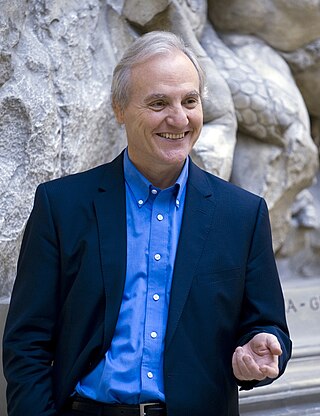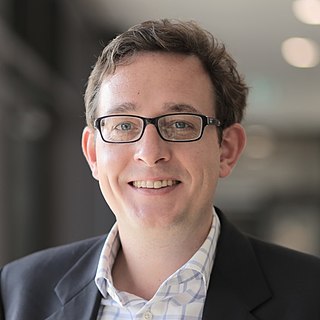Related Research Articles

The Technical University of Berlin is a public research university located in Berlin, Germany. It was the first German university to adopt the name "Technische Universität".

Bruno S. Frey is a Swiss economist and visiting professor for Political Economy at the University of Basel. Frey's research topics include Political economy and Happiness economics, with his published work including concepts derived from Psychology, Sociology, Jurisprudence, History, Arts, and Theology.

Chemnitz University of Technology is a public university in Chemnitz, Germany. With over 9,000 students, it is the third largest university in Saxony. It was founded in 1836 as Königliche Gewerbschule and was elevated to a Technische Hochschule, a university of technology, in 1963. With approximately 1,500 employees in science, engineering and management, Chemnitz University of Technology is among the most important employers in the region.

Ernst Fehr is an Austrian-Swiss behavioral economist and neuroeconomist and a Professor of Microeconomics and Experimental Economic Research, as well as the vice chairman of the Department of Economics at the University of Zürich, Switzerland. His research covers the areas of the evolution of human cooperation and sociality, in particular fairness, reciprocity and bounded rationality.

Hans-Werner Sinn is a German economist who served as President of the Ifo Institute for Economic Research from 1999 to 2016. He currently serves on the German economy ministry’s advisory council. He is Professor Emeritus of Economics and Public Finance at the University of Munich.

The Clausthal University of Technology is an institute of technology in Clausthal-Zellerfeld, Lower Saxony, Germany. The small public university is regularly ranked among the Top German universities in engineering by CHE University Rankings. More than 30% of students and 20% of academic staff come from abroad, making it one of the most international universities in Germany. The university is best known for the prominent corporate leaders among its former students. In 2011, five of the 30 leading companies within the German stock index had alumni of TUC on their management board, with two of them as CEO.

The Federal Ministry for Economic Affairs and Climate Action, abbreviated BMWK, is a cabinet-level ministry of the Federal Republic of Germany. It was previously known as the "Ministry of Economy". It was recreated in 2005 as "Ministry of Economics and Technology" after it had previously been merged with other ministries to form the Federal Ministry for Economics and Labour between 2002 and 2005. The ministry is advised by the Council of Advisors on Digital Economy.

Volker Oppitz is a German economist and mathematician.

Germany has a universal multi-payer health care system paid for by a combination of statutory health insurance and private health insurance.

Health technology assessment (HTA) is a multidisciplinary process that uses systematic and explicit methods to evaluate the properties and effects of a health technology. Health technology is conceived as any intervention at any point in its lifecycle. HTA aim is to inform "decision-making in order to promote an equitable, efficient, and high-quality health system". It has other definitions including "a method of evidence synthesis that considers evidence regarding clinical effectiveness, safety, cost-effectiveness and, when broadly applied, includes social, ethical, and legal aspects of the use of health technologies. The precise balance of these inputs depends on the purpose of each individual HTA. A major use of HTAs is in informing reimbursement and coverage decisions by insurers and national health systems, in which case HTAs should include benefit-harm assessment and economic evaluation." And "a multidisciplinary process that summarises information about the medical, social, economic and ethical issues related to the use of a health technology in a systematic, transparent, unbiased, robust manner. Its aim is to inform the formulation of safe, effective, health policies that are patient focused and seek to achieve best value. Despite its policy goals, HTA must always be firmly rooted in research and the scientific method".

The ZEW - Leibniz Centre for European Economic Research in Mannheim is an economic research institute in the Gottfried Wilhelm Leibniz Science Association (WGL). It is headed by President Achim Wambach and Commercial Director Thomas Kohl. According to the RePEc ranking, ZEW is one of the leading European economic research institutes. Currently, ZEW has 188 employees, 116 of whom are scientists.
Knut Blind is a German economist. He is active in the fields of innovation economics focusing on regulation and standardization.

The National Association of Statutory Health Insurance Physicians (NASHIP) - in German "Kassenärztliche Bundesvereinigung (KBV)", based in Berlin, is the co-ordinating body of all 17 State Associations of Statutory Health Insurance Physicians in Germany. As of 2018, it represented about 175,000 office-based physicians' and psychotherapists in Germany. NASHIP is co-owner of the medical journal Deutsches Ärzteblatt and of the German Agency for Quality in Medicine, a member of the Guidelines International Network - together with the German Medical Association.
Christine Katharina Volkmann is a German Economist and holds the UNESCO Chair in Entrepreneurship and Intercultural Management at the Schumpeter School of Business and Economics of the University of Wuppertal.
Andreas Löschel is a German economist currently holding the chair of Energy and Resource Economics at the University of Münster. He is the director of the Centre of Applied Economic Research Münster (CEAW). His research interests include applied microeconomics, energy economics and the economics of climate change. He is ranked among the most influential economists in his field. In an annual Frankfurter Allgemeine Zeitung Ranking, he is among the 25 most influential economists in Germany.

Krista Sager is a German politician of the Alliance 90/The Greens party who served as party co-leader between 1994 and 1996, and co-leader of the Greens group in the Bundestag between 2002 and 2005.

Julia Jäkel is a German business executive and publisher. She serves as non-executive director of several companies. From 2012 to 2021, Jäkel was Chief Executive Officer of Gruner + Jahr and a member of the Bertelsmann Group Management Committee. She also chaired the Bertelsmann Content Alliance. Jäkel is a widely known promoter of diverse leadership.

Philipp Sandner is a German economist and professor in the area of business and IT at the Frankfurt School of Finance & Management.
Stefan Seuring is a German economist and university professor. Since 2011, he has been heading the Supply Chain Management department at the University of Kassel.

Norbert Altenkamp is a German politician of the Christian Democratic Union (CDU) who has been serving as a member of the Bundestag since 2017. He previously served as mayor of Bad Soden.
References
- 1 2 3 "Fakultät VII Wirtschaft & Management: Head of Department". www.mig.tu-berlin.de. Retrieved 27 March 2019.
- 1 2 3 4 5 "Fakultät VII Wirtschaft & Management: Fachgebietsleiter". www.mig.tu-berlin.de. Retrieved 27 March 2019.
- 1 2 3 "Fakultät VII Wirtschaft & Management: Research". www.mig.tu-berlin.de. Retrieved 27 March 2019.
- 1 2 "Fakultät VII Wirtschaft & Management: News". www.mig.tu-berlin.de. Retrieved 27 March 2019.
- 1 2 "Fakultät VII Wirtschaft & Management: Editorship and membership of editorial boards". www.mig.tu-berlin.de. Retrieved 27 March 2019.
- 1 2 F.A.Z. "F.A.Z.-Rangliste der Ökonomen: Deutschlands einflussreichste Ökonomen 2018". Frankfurter Allgemeine Zeitung (in German). ISSN 0174-4909 . Retrieved 27 March 2019.
- 1 2 "F.A.Z.-Rangliste der Ökonomen: Deutschlands einflussreichste Ökonomen 2017". Frankfurter Allgemeine Zeitung (in German). ISSN 0174-4909 . Retrieved 27 March 2019.
- 1 2 "F.A.Z.-Ökonomenranking: Die einflussreichsten Ökonomen in der Forschung". Frankfurter Allgemeine Zeitung (in German). ISSN 0174-4909 . Retrieved 27 March 2019.
- ↑ "Fakultät VII Wirtschaft & Management: Publications". www.mig.tu-berlin.de (in German). Retrieved 27 March 2019.
- 1 2 "Fakultät VII Wirtschaft & Management: Curriculum Vitae". www.mig.tu-berlin.de. Retrieved 27 March 2019.
- 1 2 3 "Fakultät VII Wirtschaft & Management: Professional experience". www.mig.tu-berlin.de. Retrieved 27 March 2019.
- ↑ "Fakultät VII Wirtschaft & Management: Research fellows". www.mig.tu-berlin.de. Retrieved 27 March 2019.
- ↑ "Fakultät VII Wirtschaft & Management: Administrative office". www.mig.tu-berlin.de. Retrieved 27 March 2019.
- ↑ "Fakultät VII Wirtschaft & Management: Current Projects". www.mig.tu-berlin.de. Retrieved 27 March 2019.
- 1 2 "Fakultät VII Wirtschaft & Management: Advisory activity (a selection)". www.mig.tu-berlin.de. Retrieved 27 March 2019.
- ↑ Members of the Scientific Advisory Board for Pan-European Commission on Health and Sustainable Development World Health Organization.
- ↑ F.A.Z. "F.A.Z.-Rangliste der Ökonomen: Deutschlands einflussreichste Ökonomen". Frankfurter Allgemeine Zeitung (in German). ISSN 0174-4909 . Retrieved 27 March 2019.
- ↑ "F.A.Z-Ökonomenranking 2015: Deutschlands einflussreichste Ökonomen". Frankfurter Allgemeine Zeitung (in German). ISSN 0174-4909 . Retrieved 27 March 2019.
- ↑ "Ökonomenranking 2014: Die einflussreichsten Ökonomen in der Forschung". Frankfurter Allgemeine Zeitung (in German). ISSN 0174-4909 . Retrieved 27 March 2019.
- ↑ Schreyögg, J.; Stargardt, T.; Velasco-Garrido, M.; Busse, R. (November 2005). "Defining the 'Health Benefit Basket' in nine European countries". The European Journal of Health Economics. 6 (S1): 2–10. doi:10.1007/s10198-005-0312-3. PMC 1388078 . PMID 16270212.
- ↑ "Fakultät VII Wirtschaft & Management: Health Systems and Policies". www.mig.tu-berlin.de. Retrieved 27 March 2019.
- ↑ Diagnosis-related groups in Europe : moving towards transparency, efficiency and quality in hospitals. Busse, Reinhard, 1963-, World Health Organization. Regional Office for Europe., EuroDRG. Maidenhead: Open University Press. 2011. ISBN 9780335245581. OCLC 771999471.
{{cite book}}: CS1 maint: others (link) - ↑ Pross, Christoph; Geissler, Alexander; Busse, Reinhard (March 2017). "Measuring, Reporting, and Rewarding Quality of Care in 5 Nations: 5 Policy Levers to Enhance Hospital Quality Accountability". The Milbank Quarterly. 95 (1): 136–183. doi:10.1111/1468-0009.12248. PMC 5339388 . PMID 28266076.
- ↑ Busse, Reinhard; Stahl, Juliane (September 2014). "Integrated Care Experiences And Outcomes In Germany, The Netherlands, And England". Health Affairs. 33 (9): 1549–1558. doi: 10.1377/hlthaff.2014.0419 . PMID 25201659.
- ↑ Aiken, Linda H.; Clarke, Sean P.; Sloane, Douglas M.; Sochalski, Julie A.; Busse, Reinhard; Clarke, Heather; Giovannetti, Phyllis; Hunt, Jennifer; Rafferty, Anne Marie; Shamian, Judith (May 2001). "Nurses' Reports On Hospital Care In Five Countries". Health Affairs. 20 (3): 43–53. doi:10.1377/hlthaff.20.3.43. PMID 11585181.
- ↑ "Fakultät VII Wirtschaft & Management: Versorgungsforschung". www.mig.tu-berlin.de. Retrieved 27 March 2019.
- ↑ "Fakultät VII Wirtschaft & Management: Health Economics". www.mig.tu-berlin.de. Retrieved 27 March 2019.
- ↑ Busse, Reinhard; Orvain, Jacques; Velasco, Marcial; Perleth, Matthias; Drummond, Michael; Gürtner, Felix; Jørgensen, Torben; Jovell, Albert; Malone, Jim; Rüther, Alric; Wild, Claudia (21 May 2002). "Best practice in undertaking and reporting health technology assessments. Working group 4 report". International Journal of Technology Assessment in Health Care. 18 (2): 361–422. doi:10.1017/S0266462302000284. PMID 12053427. S2CID 21951340.
- ↑ "Fakultät VII Wirtschaft & Management: Health Technology Assessment". www.mig.tu-berlin.de. Retrieved 27 March 2019.
- ↑ "Euro DRG | About". eurodrg.projects.tu-berlin.de. Retrieved 27 March 2019.
- ↑ "MiGHecor: Berlin Centre of Health Economics Research (BerlinHECOR)". www.mig.tu-berlin.de. Retrieved 27 March 2019.